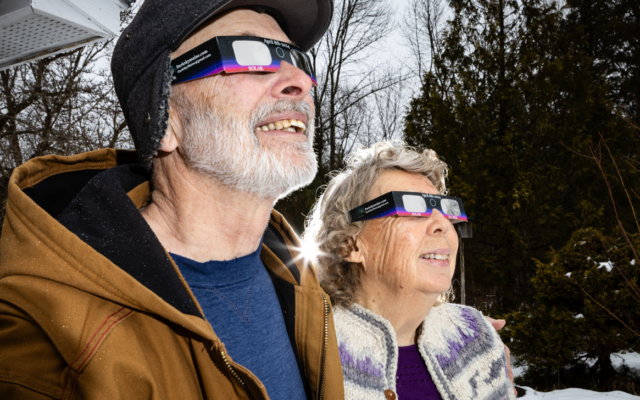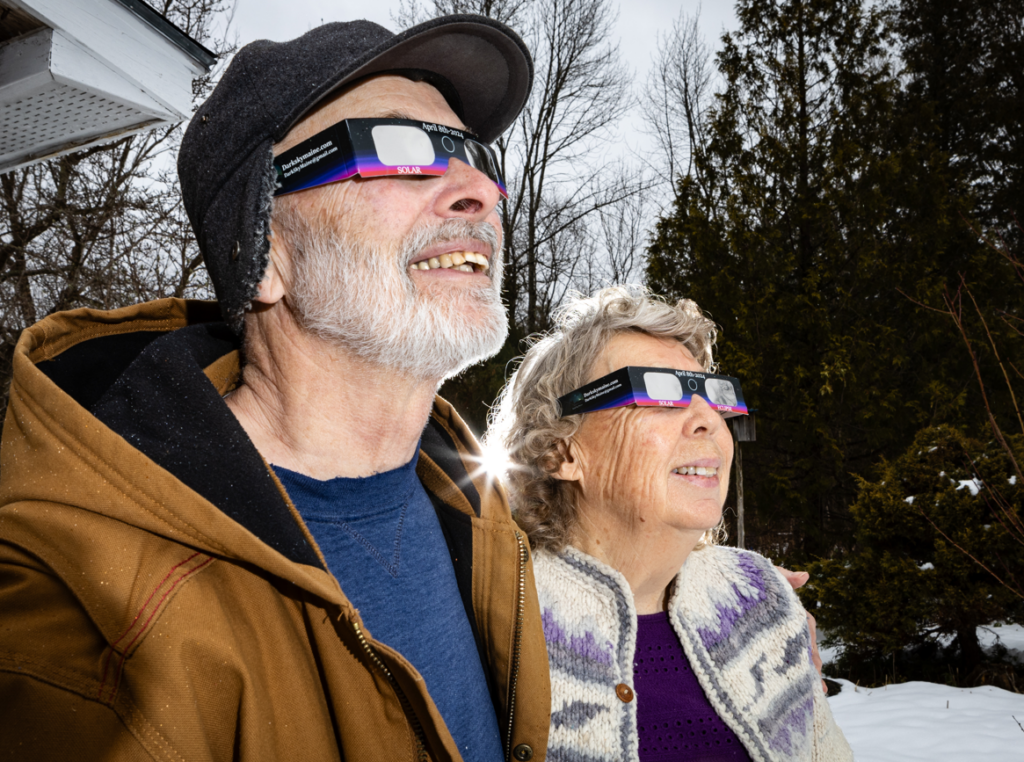
Stargazing connected these Mainers. They’ll finally see a eclipse together
By Troy R. Bennett, Bangor Daily News Staff
DEXTER — Dennis and Connie Hall were teenagers in July 1963, the last time a total solar eclipse did its sky-darkening dance in the skies above the state.
The 16- and 15-year-old pair had met, but not quite fallen in love. Both ended up watching that twice-in-a-lifetime event all by themselves. Now, married for most of the ensuing 61 years, with two grown children, they’re getting a second chance to watch the celestial magic happen, together.
It’s only fitting, since heavenly stars are what brought them together, in the first place.

VIEWING TOGETHER — Teenagers at the time, Dennis and Connie Hall missed seeing the 1963 eclipse together. Now, after more than 50 years of marriage, they plan to watch this one together.
“My father was part of an astronomy club here in Dexter, and Dennis joined it,” Connie Hall said, sitting at her kitchen table Saturday morning, “probably the year before the eclipse.”
Her father was Irving L. Stevens, a former hobo, inventor of Irving’s Fly Dope and amateur astronomer, who garnered a New York Times obituary when he died in 1999.
Connie Hall had no particular interest in astronomy, but her father often dragged her, and her siblings, to the club’s outdoor stargazing parties. It’s there she first met her future husband, Dennis Hall, though it wasn’t love at first sight.
“It was way too dark,” Connie Hall said.
At the time Dennis Hall joined the astronomy club, the United States’ space race with Russia was in full swing. Alan Shepard had recently become the first American in space, and President John F. Kennedy had just given his now famous “to the moon” speech.
With space exploration on the country’s collective mind, local astronomy clubs were popping up everywhere. Even so, commercially made telescopes were scarce and expensive — though that didn’t keep the Dexter club from looking up at the night sky.
Connie Hall’s father, and a handful of other men in the club, worked at the Fay & Scott machine shop in Dexter. There, with access to tools and equipment, they fabricated their own telescopes.
“A lot of telescope parts went home in lunchboxes,” Connie Hall said.
“And when I went to work there, years later, I kind of carried on the tradition,” Dennis Hall said.
Still, the Dexter astronomy club didn’t get together on July 20, the day of the eclipse. Instead, Connie Hall’s father took his family to their aunt’s camp on Morrill Pond in Hartland, while Dennis Hall invited members of his high school science club to watch the event from Rand Hill, where he lived, in St. Albans.
But Dennis and Connie Hall still ended up watching the eclipse alone, just 15 miles apart.
“Nobody showed up,” Dennis Hall said of his school club members, “and I can’t remember where my brother, Jay, was.”
“You should have been on the pond with us,” Connie Hall said. “If Dad had known, he would have come and got you.”
At Morrill Pond, Connie Hall’s father took her siblings up nearby Chase Hill to watch the eclipse from atop the fire tower. She stayed behind, however, and watched events unfold while floating in an innertube on the water. Her father had made her a makeshift set of eclipse glasses out of very overexposed black-and-white film negatives.
“I remember the shadows got deeper and deeper,” Connie Hall said. “And it got really quiet and cooler. The birds stopped singing — and then it was over.”
On Rand Hill, Dennis Hall had a slightly different experience.
“Just before totality, a humongous cloud came and covered up everything,” he said. “I didn’t see anything.”
But he does remember the hill getting dark and confused tree frogs beginning to sing.
After the eclipse passed, Connie and Dennis Hall didn’t think too much more about it, or the next one, 61 years in the future. The pair married five years after the 1963 eclipse and got on with their lives — though Dennis did continue making telescopes, even helping NASA map the surface of the moon with his nighttime observations.
“Our thoughts were mostly about buying a piece of land, building a house, having a family and just doing what people do,” Dennis Hall said.
And that’s what they did.
But now, it’s finally time for Maine’s next total solar eclipse, and Dennis and Connie Hall will both be watching again. Only this time, they won’t be alone.
Reporter’s note: These two are my wife’s parents, and I love them very much.